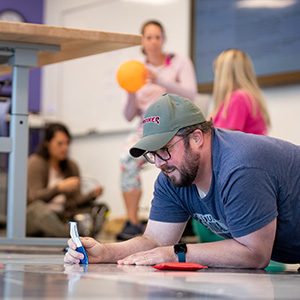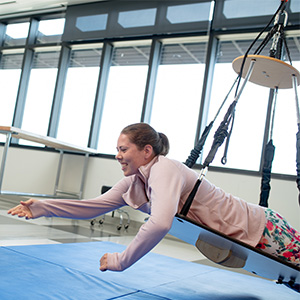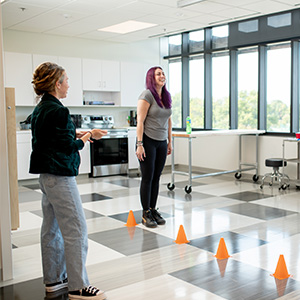Help People Thrive with an Occupational Therapy Assistant Degree
St. Louis Community College offers a top-ranked occupational therapy assistant program designed to prepare students to help people of all ages live independently and reach their full potential. As a certified occupational therapy assistant (OTA), you’ll gain the skills to support clients recovering from injury, assist children with developmental delays or help older adults maintain safety and independence at home.
Established in 1983, STLCC’s occupational therapy training program is the oldest in the St. Louis area. Graduates earn an associate in applied science (AAS) degree and are eligible to take the national board exam through the National Board for Certification in Occupational Therapy (NBCOT). Once licensed in Missouri, Illinois or other states, they can begin meaningful careers helping people in hospitals, clinics, schools and community health settings.
This program has special admission requirements. Please review the requirements checklist before submitting your application.
What is the OTA Program at St. Louis Community College?
STLCC’s OTA training program prepares students to help people of all ages gain independence and improve daily living skills. You’ll learn to use educational, leisure, vocational and rehabilitation activities to help clients overcome challenges.
The program teaches skills like assessment, planning interventions and tracking progress while emphasizing human development, interpersonal skills and the therapeutic use of occupation. You’ll gain practical experience, develop critical thinking and self-reflection, and learn from faculty who are trained and active in the field, preparing you to make a real difference in people’s lives.
Once admitted, students spend three semesters in the classroom, including Level 1 Fieldwork, an introduction to clinical practice. This is followed by two 8-week full-time clinical experiences, known as Level 2 Fieldwork. After completing both Level 2 Fieldworks, students graduate and can take the NBCOT board exam.

What Can You Do with an Occupational Therapy Assistant Associate Degree?
With an OTA associate degree, you can become a certified occupational therapy assistant (COTA). In this role, you work under the guidance of an occupational therapist, helping patients regain skills for daily living and independence through therapeutic activities.
OTAs work in a wide range of settings and with people of all ages, including schools, hospitals, outpatient clinics, skilled nursing facilities, physician offices, re-entry centers and homeless shelters. You might help toddlers, children, adults or older adults participate fully in daily life.
There are also unique career opportunities for OTAs beyond traditional settings, such as aquatic therapy, therapeutic horsemanship or teaching in academic programs, giving you flexibility to follow your interests while making a real impact.
AAS in OTA Details
- Degree offered: Associate in applied science
- Locations: Forest Park
- Hours to complete: 67
- Program contact name: Rose McAndrew
- Program contact email: rmcandrew@stlcc.edu
- Admissions information: stlcc-occupationaltherapy@stlcc.edu
- Accreditation:
The OTA program is accredited by the Accreditation Council for Occupational Therapy Education (ACOTE) of the American Occupational Therapy Association (AOTA), located at 7501 Wisconsin Avenue, Suite 510E Bethesda, MD 20814. AOTA’s telephone number is (301) 652-6611. The website is acoteonline.org. - This program meets the educational requirements for state licensure in the following states: Missouri and Illinois. Students interested in pursuing licensure in a different state should contact the program coordinator for more information.
Cost of Attendance
Tuition and fees are subject to change.
Maintenance fees for pre-requisite, general education and OTA courses:
- In District -$122/credit hour
- Out of district -$171/credit hour
- Out of state -$233/credit hour
(In District total cost - $7,738.50 for two years taking all courses in the curriculum)
Textbooks and course materials: Students are expected to purchase the required textbooks and course materials for OTA courses each semester. These can cost anywhere from $200-$800 per year.
Health insurance: All OTA students are required to carry personal health insurance at your expense. Students are also required to have liability insurance each semester for fieldwork; however, this is covered by the College through tuition fees.
Castlebranch Compliance Tracker: Required for the student to upload OTA Program paperwork requirements. The cost is
$27.50.
Family Care Safety Registry: Required for placement at fieldwork sites. Will cost $15.
Criminal background check: Required for placement at fieldwork sites. Will cost approximately $14 and up depending on the number of states you’ve lived in.
Drug screen: Required for placement at fieldwork sites. Approximately $35.
OTA Program Shirt/Lab Coat/Uniform: OTA program shirts are required for field trips, skills practicum checkouts, etc. They cost $25. Some fieldwork sites require a lab coat, uniform, or “scrubs” that you would be responsible for acquiring. If the sites do not require anything in particular you are expected to wear your OTA program shirt.
Fieldwork Education Expenses: Students are responsible for potential expenses related to of fieldwork activities (i.e. gas, transportation costs, housing if applicable, etc.).
After graduation:
National Certification Examination: Application fee and fees to cover score reports-- $600
During the last semester of the program, students will be given detailed and current information regarding specific exam fees.
Licensure fees: Fee will vary depending on state you apply but around $30 - $50 in MO/IL
The total estimated cost of the program ~$9305
Financial Aid Information
St. Louis Community College provides a comprehensive financial aid program funded by federal, state and private agencies. STLCC provides a Cost Calculator to help students estimate costs. Plus we'll help you navigate scholarship options and financial aid.
Admission Requirements
We admit up to 24 students every fall, and there is no waitlist for the program at this time. Admission to the OTA program is on a first-come, first-served basis for those students who meet the minimum academic and other requirements.
To facilitate the entry of students into the program, an applicant list is used. A student is placed on the applicant list once program application prerequisites have been met and a program application has been submitted. To apply, students meet with an advisor. Placement on the applicant list is based solely on the date of application. Students should regularly check their STLCC email as that is how the program will communicate further information. Admission offers will be sent via STLCC email in the spring to those being offered admission to the program for the fall semester. All students joining the program must attend a mandatory program orientation in May.
The OTA program is a selective admission, college-level program. Students must have successfully completed specific requirements prior to application, including:
- high school or college cumulative grade point average of 2.5
- minimum placement test scores or successful completion of specific courses
- successful completion of BIO 207 - Anatomy and Physiology I with a "C" or higher within the last five years
- successful completion of PSY 200 - General Psychology with a "C" or higher within the last five years
Students must complete the appropriate pre-requisite courses before enrolling in the required general education, biology, and OTA courses.
Once accepted to the OTA Program, there will be a mandatory orientation during the first part of May.
All OTA students must complete Level II fieldwork within 18 months following completion of academic coursework.
Please be aware that a felony conviction could impact a student's ability to participate in fieldwork experiences, ability to take the certification exam, and/or obtain a license to practice occupational therapy. See the OTA program contact for more information.
Please Note: Credits earned in STLCC’s OTA AAS program generally do not transfer to occupational therapy master’s degree programs. The curriculum for an OTA degree is distinctly different from the curriculum for an OT degree. OTA focuses on technical skills and knowledge, while the OT degree emphasizes theory, research, and management. In addition, the OT degree is an entry-level master’s degree. In most cases, a student would need to complete a bachelor’s degree before beginning an OT degree program.
OTA Program Admissions Requirements Checklist
In compliance with St. Louis Community College policies, the OTA Program is committed to nondiscrimination with respect to race, color, creed, religion, sex, sexual orientation, national origin, ancestry, age, disability, genetic information, or status as a disabled or Vietnam-era veteran.
Program Outcomes
Graduation Rate:
Graduation Year |
# of Students Admitted/Graduated |
Graduation % Rates |
| 2022 | 24/8 | 33% |
| 2023 | 17/11 | 65% |
| 2024 | 13/9 | 69% |
3-year Total/Average |
54/28 | 52% |
For the most up-to-date information on STLCC’s OTA graduates’ certification exam scores,
visit the National Board for Certification in Occupational Therapy (NBCOT).
Why You Should Choose STLCC's OTA Program

A Well-Established, Affordable Program
We believe cost should never be a barrier to achieving your potential. Save over $4,700 per year with tuition that's one-third lower than other local institutions.

State of the Art Facilities
Come learn in spaces designed by occupational therapy practitioners to promote the highest level of learning. The OTA lab includes a variety of unique spaces, such as a hospital room and a functioning kitchen, to gain hands-on experience that simulates future clinical practice.

Opportunities in the Field
The OTA program includes clinical affiliation agreements for Level 2 Fieldwork throughout the St. Louis metropolitan area that include more exposure to specific practice settings. You will be able to do Level 2 Fieldwork in two unique settings to prepare you as an OTA generalist.
STLCC. What's your reason?